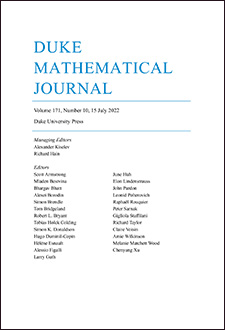Abstract
In this paper we introduce and develop the theory of FI-modules. We apply this theory to obtain new theorems about:
• the cohomology of the configuration space of distinct ordered points on an arbitrary (connected, oriented) manifold;
• the diagonal coinvariant algebra on sets of variables;
• the cohomology and tautological ring of the moduli space of -pointed curves;
• the space of polynomials on rank varieties of matrices;
• the subalgebra of the cohomology of the genus Torelli group generated by ;
and more. The symmetric group acts on each of these vector spaces. In most cases almost nothing is known about the characters of these representations, or even their dimensions. We prove that in each fixed degree the character is given, for large enough, by a polynomial in the cycle-counting functions that is independent of . In particular, the dimension is eventually a polynomial in . In this framework, representation stability (in the sense of Church–Farb) for a sequence of -representations is converted to a finite generation property for a single FI-module.
Citation
Thomas Church. Jordan S. Ellenberg. Benson Farb. "FI-modules and stability for representations of symmetric groups." Duke Math. J. 164 (9) 1833 - 1910, 15 June 2015. https://doi.org/10.1215/00127094-3120274
Information





